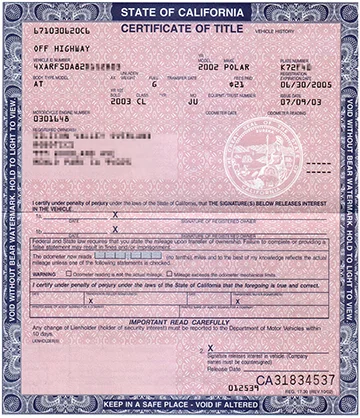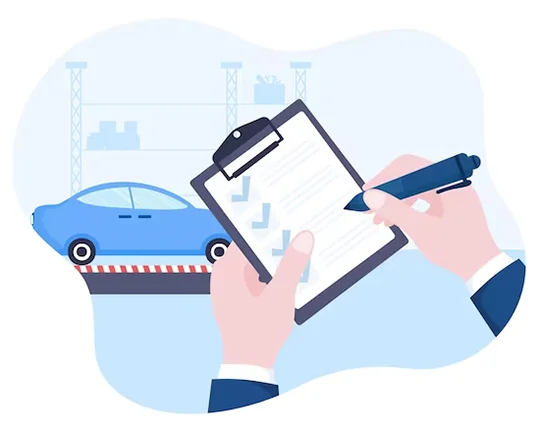Thinking of buying a used car? Most sellers are honest, and many second-hand deals go through without a hitch. But there's always a risk that a seller might mislead you and have you paying more than the car's true value.
Getting stuck with a problematic car you thought was clean can leave you bewildered and out of pocket. You can reduce the risk of fraud by performing a title check to see the car's true history.
What Is a Title?
A vehicle title is a state-issued document that proves legal ownership. State motor-vehicle agencies (often called DMVs) keep ownership and title-brand records in their databases so that ownership can be verified.
On paper, it's a single-sheet certificate with two printed sides. It may include:
- Vehicle history/brands (e.g., salvage, rebuilt, lemon buyback);
- Registered owner's name and address;
- Prior title state;
- VIN (Vehicle Identification Number);
- Year, make, model, and body type;
- Color (in some states);
- Use (private or commercial);
- License plate number (in some states);
- Title number;
- Issue date and previous issue date;
- Odometer reading as of the issue date;
- Lienholder information and lien release (if applicable);
- Signature(s) of authorized state official(s);
- Assignment section (where buyer and seller sign to transfer ownership).
During the purchase, draw up a purchase agreement (bill of sale) that outlines the terms of the sale (for example, that you accept the car "as is").
You can't transfer ownership with a bill of sale alone. The current owner must also sign over the title.
After that, submit the title (and the bill of sale if requested) to your local DMV. The DMV will update its records to list you as the new owner and complete the legal transfer.
One of the biggest red flags is a seller who hesitates to present the physical title for inspection. That can indicate a problem with the document.
Types of Titles
Title "brands" describe a vehicle's past. "Clean" is the most common, but you'll also see terms like salvage, rebuilt, and lemon buyback. Note: "clear" commonly refers to lien status (no active lien), not to title branding.
Clean
A clean title indicates no major brands have been reported to the DMV. "Reported" is key–some accidents or damage never reach official records (for example, if no insurance claim is filed). Always get a professional inspection.
Clear (No Lien)
Financed cars usually carry a lien, so the title isn't "clear." Don't buy until the owner completes the lien release and the DMV shows them as the sole owner. Also confirm there are no outstanding loans or fees.
Salvage
"Salvage" means an insurer declared the vehicle a total loss and typically paid the owner, after which the vehicle entered the salvage market. Damage levels vary; some vehicles can be repaired cost-effectively, but you must research the extent of damage and realistic repair costs.
Lemon / Factory Buyback
"Lemon law buyback" or similar brands indicate significant, recurring defects under warranty. In California, for instance, the presumption kicks in if the same defect isn't fixed after four or more attempts, after two attempts for a serious safety defect, or after 30 cumulative days out of service within 18 months/18,000 miles. Such cars are generally higher risk.
Rebuilt
Rebuilt vehicles were previously salvaged but passed inspection after repairs and were deemed roadworthy again.
Even quality repairs can leave hidden issues, and long-term reliability may differ from accident-free cars. Rebuilt vehicles are usually priced below comparable clean-title cars, and insurance or resale can be more difficult.
Export
Some paperwork is marked "For Export Only." These vehicles are typically not eligible for U.S. titling/registration. Rules vary by state–verify with your DMV before purchase.
Other
Additional designations include:
- Junk/Non-Repairable – vehicle is a total loss and not repairable; usable only for parts;
- Odometer (Not Actual/Exempt/Rollback) – indicates mileage issues or tampering;
- Dismantled – vehicle is beyond repair.
State-by-State Differences in Title Brands
Title brands aren't fully standardized in the U.S.–names, thresholds, and legal effects vary by state. A "clean" title only means no reported brands in that state's system; it does not guarantee a damage-free history. Also remember: clear usually refers to "no lien", not "no brand."
What Varies by State
- Naming & Scope: "Rebuilt" vs. "Reconstructed", "Non-Repairable/Junk/Parts-Only," specific brands for Flood/Hail/Fire, "Manufacturer Buyback/Lemon," and odometer labels (Not Actual, Exceeds, Exempt).
- Legal Effect: Whether a brand is permanent and follows the vehicle; whether non-repairable cars can ever be retitled (often no); whether branded vehicles can be registered or emissions-tested.
- Triggers & Thresholds: Total-loss percentage for "salvage", flood definitions, and what documentation is required to apply a brand.
- Path Back to Roadworthy: Requirements to move from Salvage to Rebuilt (photos, parts receipts, state inspection forms), and how the resulting brand is named ("Rebuilt", "Prior Salvage", "Reconstructed", etc.).
- Electronic Titles & Liens: Some states use ELT; lien release steps differ. A title can be "clean" yet not clear if a lien remains.
Why Do You Need to Check the Title?
Your main goal is to avoid problematic cars and save money, time, and stress. A title check can reveal undisclosed brands like salvage, rebuilt, or odometer discrepancies.
Title checks help flag rushed or "too-good-to-be-true" deals and are essential for sight-unseen purchases and salvage auctions.
When sellers can't provide full history (e.g., dealer lots), a title search offers a look-back to when the car left the factory.
Where to Find the Title Number?

Title numbers vary by state (often 7–13 characters). They are used to identify a specific title issuance, not the vehicle itself.
Common places to find it:
- On the title (and in some states on the registration card): Look near the VIN or in the "Title No." field.
- On a registration renewal notice: Recent renewal mailings may list it.
If you can't locate it, contact your DMV. Many states can provide electronic records or issue a replacement.
Title vs. VIN Number
A title number lets you reference the current title record (owner, plate assignment in some states, active liens). The number changes whenever a new title is issued (e.g., ownership changes, duplicate issued, lien satisfied, out-of-state retitle), so it's not reliable for tracking a vehicle's lifetime.
The VIN encodes vehicle specifications (make, model, year, body, engine, assembly plant, etc.).
With a paid history report, you can also see recalls, service/inspection entries (when available), accidents, and registration events.
Free Title Check by VIN

FAXVIN provides a free VIN lookup after you enter the VIN in our title checker and click "Next." The free tool decodes the VIN and shows basic specifications such as make, model, model year, body style, and engine. Some additional build features may appear when available.
The free check doesn't include historical events like accidents, service history, or ownership changes. For complete records, purchase a paid report.
Use free decoding to compare options. Once you narrow your list, order full reports for the vehicles you're serious about. Paid reports highlight categories that may have data (ownership, odometer, accidents, brands, liens, etc.) so you can decide whether to buy.
DMV Title Check
The National Motor Vehicle Title Information System (NMVTIS) is a U.S. Department of Justice program that aggregates title, brand, and certain theft/salvage information from state agencies, insurers, and junk/salvage yards. Paid reports include NMVTIS-sourced title/brand information alongside other data.
How to Check the Status of a Car Title?
Our title lookup by VIN compiles data from trusted sources (including state DMVs, insurance/salvage reporting via NMVTIS, auctions, and service/inspection databases) to bring key information into one report. Check it in 4 steps:
- Use the VIN search at the top of this page.
- Enter the vehicle's 17-character VIN to begin verification.
- Click "Check VIN."
- Review the detailed vehicle history report–this only takes a few minutes.
Because some sellers try to inflate a car's value by hiding its past, a VIN/title check helps you save money and avoid vehicles with troubled histories.
Conclusion
Ask the seller for the title and VIN to perform due diligence. When you meet, inspect the car thoroughly–ideally with a trusted mechanic. Following these steps helps you avoid costly surprises.
References and Links
- NHTSA Recalls Lookup – Check open safety recalls by VIN
- FTC: Used Cars – Official used-car buying tips
- AAMVA: Salvage & Junk Titles – How states brand salvage/junk/rebuilt
- USA.gov: State DMV Services – Find your state's DMV services
Frequently Asked Questions
Can I Sell a Car Without a Title?
What does a duplicate/replacement title mean?
Do I Need a Notary To Transfer a Title?
How Long Is the Title Number?
Is a Title the Same as Registration?
The Seller 'Lost the Title.' Should I Still Buy?
Can I Transfer an Out-of-State Title and Will Brands Carry Over?
Is an 'Open Title' (Buyer Line Left Blank) Okay?
Do I Have To Complete an Odometer Disclosure?
How Do Electronic Titles and Electronic Liens (ELT) Affect a Private Sale?
Will I Need a VIN Inspection or Emissions/Safety Inspection?
As a Seller, Do I Need To File a Notice of Sale/Release of Liability?
Was this article helpful?